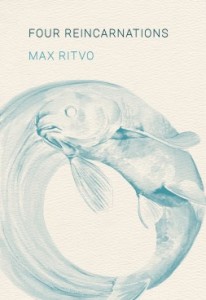Book Review
It’s common to describe poetry as a form of dreaming. Max Ritvo’s first and only full collection, Four Reincarnations, exemplifies poetry as dream. “Touching the Floor” opens with a series of images typical of his work:
I touch my palms to the floor
and granite bulls surge up my arms
and lock in my shoulders.
Water flecks on my back
and my head is shaved
by bladed cream.
But then my time in my body is up
and it’s time for my mind:
It seeks wisdom
and the bulls fall into a well,
their faces falling apart—
The passage is unique in its expression of the mind/body relationship and mourning the loss of the body. But the experience of reading Ritvo’s work comes not from encountering unique use of images here and there, rather from hearing a voice speaking in the language of images and visions.
His writing can also be frank. In “Living It Up,” Ritvo sets the scene with an image of his bed on fire and the person he’s addressing abandoning him. He writes:
The springs want to embrace each other
but they’re afraid if they break
their spiral, they will never
be able to hold anyone.
I wish you would let me know
how difficult it is to love me.
Then I would know you love me
beneath all that difficulty.
Describing mattress springs that want to embrace but are afraid to break their shape is comic, sad, and expressive of an underlying sense of failure to love. Ritvo’s ability to follow striking imagery with blunt statement, in this case the admission of “how difficult it is to love me,” gives his work a clarity and pathos that can cut through the dreamlike quality. His poems can at the same moment be deep expressions of love and of frustration with love while acknowledging the frustration others have with him.
The poems’ full weight comes from the way Ritvo found to share visions of life lived in the shadow of death. Ritvo died in 2016 in his twenties after living for nearly a decade with cancer, and shortly before his collection was published. While the poems aren’t only about death, death colors how the speaker in his poems looks at life, or rather dreams it. In “Holding a Freshwater Fish in a Pail above the Sea,” a dream in which the speaker ultimately puts a pail with a koi in the ocean, we read:
Where he wants space
he will get salt.
Where key traces
of the silence
should hang inside
his cathedral
of musical
blood—
Instead, delicious
crystal drills
will crack it all
open; the church,
its ebbs and flows.
Ritvo is not only caught in a troubling, disjointed, ephemeral world, and not only feels inadequate within it, but also acts as an agent of destruction by releasing the koi into the sea. And in “Black Bulls” he writes more bluntly:
This is the basis
upon which we seek company:
I am bad,
the world is bad.
The dreaming isn’t always easy to follow. “Black Bulls” is a case in point, which begins:
My mind is
three black bulls on
three hills of sand, far apart.
My loved ones
sleep in clay hollows.
Though it’s natural to reach for meaning, there are places where it’s hard to be sure what the images say. At times it doesn’t matter, as the images still convey impressions and feelings larger than, or in another realm from, easily described meaning.
Characteristically, Ritvo’s need to apologize ends the poem: “I am so sorry that you have come to this mind of mine.” He assumes that his visions can make us uncomfortable.
In some poems, the imagination is closely tied to the world, as with “The End”:
The more there is, the more loss there is—
true not only of the world, but of perceiving it,
even of the imagination sizzling on top of it.
In others, imagination is critical work to being in the world, and we are invited into that work, as with “The Big Loser”:
He starts the hard work
of the imagination,
learning to minister to the new dream.
Perhaps all that’s needed is a little rain—
for everyone to drink and have a bath.
In “The Big Loser,” there’s revelation where imagination has brought Ritvo back to the world:
All of death is right here
—the gods, the dark, the moon.
Where was I expecting death
to take me if everywhere it is
is on earth?
The visions can be disturbing while they’re impressing us with their originality. In “Poem Set in the Day and in the Night,” in which Ritvo imagines a man’s body thinning and his shadow gaining density, the man becoming a web and his shadow a spider, we read:
and suddenly there’s a new order
to the life he never knew was shared.
That night a cricket kills himself in the man.
It’s unbearable, his silk body thrilled through
with the screams. All the man is: a speaker—
and not loud enough to communicate
the fear to God.
Enough, however, to bring the spider.
It’s not necessarily the strangeness of the images that’s most lasting, but their clarity, starkness, and difficult implications.
Along with tough images from someone facing the end of life, there are generosity and extravagance in Ritvo’s poems—a result of an imagination on overdrive. They’re rooted in a desire to share the way his mind works—even when he’s afraid the revelation may feel disturbing—and to connect. Reading his poems is to be bathed and swept along in his dreaming.
About the Reviewer
Brian Satrom lives and works in Minneapolis. His most recent poetry and book reviews appeared online in MAYDAY Magazine.
